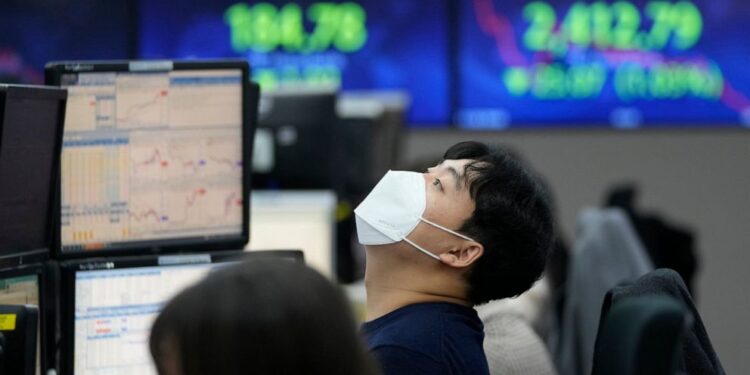Shares have skidded in Asia, with Hong Kong dipping as much as 4% following weekend protests in various cities over China’s strict zero-COVID lockdowns
Shares skidded in Asia on Monday, with Hong Kong briefly dipping more than 4% following weekend protests in various cities over China’s strict zero-COVID lockdowns.
U.S. futures were lower after a mixed, shortened session Friday on Wall Street. Oil prices fell more than $2 a barrel.
The unrest in China is the boldest show of public dissent against the ruling Communist Party in years. It followed complaints that policies aimed at eradicating the coronavirus by isolating every case might have worsened the death toll in an apartment fire in Urumqi in the northwestern Xinjiang region.
China’s infection rate has been lower than in the United States and other countries, but the authorities are facing rising resentment over the economic and human costs of the approach known as “zero-COVID” as businesses close and families are isolated for weeks with limited access to food and medicine.
“For investors, when it comes to China, trying to predict with any degree the reopening certainty that has no certainty, basis, or track record to go by is looking like a dangerous game in the context of the disquietening protests and the colossal challenge China’s leaders now have on their hands,” Stephen Innes of SPI Asset Management said in a commentary.
Hong Kong’s Hang Seng fell 2.1% to 17,211.76 and the Shanghai Composite index lost 1.3% to 3,061.69.
On Friday, China’s central bank sought to boost the economy by easing its reserve requirement ratio, the proportion of assets banks must hold in reserve, by a quarter percentage point to 7.8%.
“The cuts are a bid to support weakening economic growth dragged down not only by COVID restrictions but also a deeper property market rout,” Mizuho Bank noted in a report. However, it said, that news was overshadowed by rising numbers of virus cases and the protests.
Tokyo’s Nikkei 225 index shed 0.4% to 28,162.83 and the Kospi in Seoul lost 1.3% to 2,408.76. In Sydney, the S&P/ASX 200 shed 0.4% to 7,229.10 following the release of weaker-than-expected retail sales data.
Bangkok’s SET was 0.2% lower while the Sensex in Mumbai added 0.4%.
On Friday, when markets closed at 1 p.m. Eastern following the Thanksgiving day holiday on Thursday, the S&P 500 fell less than 0.1% to close at 4,026.12.
Nearly 70% of stocks in the benchmark index gained ground, but the broader market was dragged lower by technology companies, whose high valuations give them more heft in pushing the market higher or lower.
The Dow Jones Industrial Average rose 0.5% to 34,347.03. The Nasdaq fell 0.5% to 11,226.36.
Long-term bond yields were relatively stable but still hovered around multi-decade highs. The yield on the 10-year Treasury, which influences mortgage rates, rose to 3.70% from 3.69% late Wednesday.
Investors remain concerned about whether the Federal Reserve can tame the hottest inflation in decades by raising interest rates without going too far and causing a recession.
The central bank’s benchmark rate currently stands at 3.75% to 4%, up from close to zero in March. It has warned it may have to ultimately raise rates to previously unanticipated levels to rein in high prices on everything from food to clothing.
Wall Street gets several big economic updates this week. The Conference Board business group will release its November report on consumer confidence and the U.S. government will release its closely watched monthly employment report.
In other trading Monday, U.S. benchmark crude oil lost $2.23 to $74.05 per barrel in electronic trading on the New York Mercantile Exchange. It gave up $1.66 on Friday to $76.28 per barrel.
Brent crude, which is used to price oil for international trading, sank $2.40 to $81.31 per barrel.
The dollar fell to 138.33 Japanese yen from 139.28 yen. The euro slipped to $1.0360 from $1.0379.
Source: abcNEWS



Recent Comments